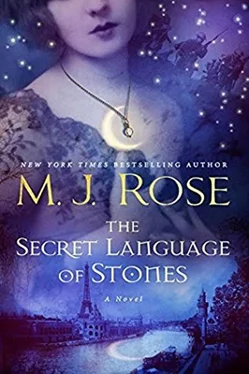M. Rose - The Secret Language of Stones
Здесь есть возможность читать онлайн «M. Rose - The Secret Language of Stones» весь текст электронной книги совершенно бесплатно (целиком полную версию без сокращений). В некоторых случаях можно слушать аудио, скачать через торрент в формате fb2 и присутствует краткое содержание. Жанр: Триллер, на английском языке. Описание произведения, (предисловие) а так же отзывы посетителей доступны на портале библиотеки ЛибКат.
- Название:The Secret Language of Stones
- Автор:
- Жанр:
- Год:неизвестен
- ISBN:нет данных
- Рейтинг книги:4 / 5. Голосов: 1
-
Избранное:Добавить в избранное
- Отзывы:
-
Ваша оценка:
- 80
- 1
- 2
- 3
- 4
- 5
The Secret Language of Stones: краткое содержание, описание и аннотация
Предлагаем к чтению аннотацию, описание, краткое содержание или предисловие (зависит от того, что написал сам автор книги «The Secret Language of Stones»). Если вы не нашли необходимую информацию о книге — напишите в комментариях, мы постараемся отыскать её.
The Secret Language of Stones — читать онлайн бесплатно полную книгу (весь текст) целиком
Ниже представлен текст книги, разбитый по страницам. Система сохранения места последней прочитанной страницы, позволяет с удобством читать онлайн бесплатно книгу «The Secret Language of Stones», без необходимости каждый раз заново искать на чём Вы остановились. Поставьте закладку, и сможете в любой момент перейти на страницу, на которой закончили чтение.
Интервал:
Закладка:
“ ‘At the first session of the Central Executive Committee elected by the fifth Congress of the Councils, a message was made public. Received by direct wire from the Ural Regional Council, it concerned the shooting of the ex-tsar, Nicholas Romanov’…” Grigori’s husky voice did not break, but he did hesitate.
“Go on,” Monsieur Orloff ordered.
Making an effort to control his emotions, Grigori continued. The story detailed how Yekaterinburg, the capital of the Red Urals, had been seriously threatened by the approach of Czechoslovak bands and a counterrevolutionary conspiracy was found. When its objective-to wrest the ex-tsar from the hands of the council’s authority-was discovered, the president of the Ural Regional Council decided to shoot the former tsar. The assassination had been carried out on July 16.
“ ‘The wife and the son of Nicholas Romanov have been sent to a place of security.’ ” Grigori’s voice came to a halt. I saw the shadow of his eyelashes on his cheek. He took a breath and then continued.
“ ‘The Central Executive Committee has now at its disposal extremely important documents concerning the affairs of Nicholas Romanov-his diaries, which he kept almost up to his last days; the diaries of his wife and his children; and his correspondence, among which are the letters of Rasputin to the Romanov family. These materials will be examined and published in the near future.’ ”
Monsieur Orloff took the newspaper from his son and looked down at it as if searching for other words. Then he put his head in his hands. The sound of his anguished sobs broke our silence. Anna went to her husband’s side. Vanya began to pace.
Grigori walked to the window and stared out into the black night.
I watched him, thinking I should go to him but not quite sure I knew how to ease his suffering or that my ministrations were wanted. We had a complicated relationship.
We’d only met a little over six months before, in January, when he had been sent home from the front after shrapnel had shattered his left leg, leaving him severely lame. He’d gone to war a strong, able-bodied man and come back a cripple. He didn’t understand that despite his injury he was handsome. Especially when his thick brown hair fell over his broad forehead. When his smile, when I could get him to smile, dimpled his cheeks. When his sleepy eyes, the uncommon color of brown diamonds, sparkled as he forgot about the war and talked to me about his passions.
Like his father and his half brother Timur, Grigori had a keen appreciation for beautiful things. It was what I enjoyed about him the most. On a walk, he was quick to point out a fine architectural detail or a particularly beautiful shade of blue in the sky. In a gallery of mediocre paintings, he could always spot the one hidden masterpiece, and in the workshop he always gravitated to the finest stones among those I was considering.
And yet he was full of bitterness about his handicap. He was angry he wasn’t at the front with the rest of his company; jealous that Leo, his younger brother, remained, proving himself a hero. Grigori could also be irascible and prone to long fits of depression. Never having met him before the war, I couldn’t know how drastically the war had changed him. But occasionally, I heard Anna or Monsieur remark on a cynicism creeping into his conversation that hadn’t been there before he’d gone away, and a new darkness that had seemed to alter his soul.
To some, that would make him unlikable, but his moodiness and tendency to isolate himself endeared him to me almost as much as his exquisite taste. His faults and the secrets beyond his shine made him unique and roused my sympathies, just as my secrets and scars roused his. Knowing that sometimes, even after a wound heals, it can still cause pain, Grigori was surprisingly sensitive about how my relationship with Timur continued to haunt and trouble me, and it strengthened the bond between us.
Sometimes I believed we might have a future. Other times I sensed we were like inmates who turned to each other in desperation rather than desire.
Watching him at the window, his shoulders rounded, his head down, my pity got the better of me and I went to him.
“I’m sorry,” I whispered as I took one of his hands.
His long fingers intertwined with mine.
“It’s very difficult to believe our tsar is truly dead,” Grigori said without turning to me, but his fingers gripped mine with a force that surprised me. He was usually more gentle.
Behind us, I heard Monsieur Orloff’s voice, weaker than its usual growl. “We need to call a meeting. We do not have the luxury of mourning.” His tone strengthened, his resolve already overtaking his pain. “Our goal has not changed. We still must restore Russia to its rightful rulers, even if that means its next generation of rulers. We need to do this so we can return to our homeland. This news of the tsar’s death only makes our imperative that much more urgent.”
Pushing himself up from his chair, Monsieur went to the telephone, which held a place of honor on a small table at the end of the couch. He didn’t sit but remained standing, almost at attention, as he picked up the receiver and waited for the operator.
Because of his fear of Bolshevik spies, organizing a meeting had become a clandestine operation. Monsieur’s former countrymen were now as much the enemy as the Germans.
Suddenly, static split the silence and then we all heard the operator’s voice booming out of the earpiece. Monsieur gave her the exchange for Tatania Tichtelew. I knew her as a woman in her seventies who frequently came to the shop in the late afternoon to gossip with Anna over a cup of tea from the silver samovar. They both drank it the way so many Russians do, in a glass cup with a cube of sugar between their teeth. Often, Tatania would order a new string of pearls. I never counted, but in the time I’d been working for Monsieur Orloff, I must have strung at least thirty strands for her, in subtly diverse colors, from dark green-black to pure star-shine white.
“Madame, forgive me for calling you at this hour,” Monsieur Orloff spoke loudly into the telephone. “But I know you are anxious to get your pearls and the stringer has finished.”
The cryptic message sent and received, we sat down at the table, beautifully set with a cream tablecloth, sparkling crystal, and fine china. The heavy and ornate silverware, decorated like the plates with the tsar’s imperial insignia, took on a greater poignancy.
Our conversation continued to revolve around the tragedy, and no one had much of an appetite, even for the cook’s tempting food. Only the wine was consumed with any relish.
“This is the kind of night when I could drown in a bottle, but will stop at two glasses,” Vanya said when Monsieur Orloff attempted to refill his wine goblet for a third time. “We have work to do and plans to make.”
After the plates were cleared, Monsieur Orloff and Vanya went to the library to prepare for the meeting. Anna went to the kitchen to speak to the cook.
“Can I see you to your rooms?” Grigori asked. “I’d appreciate some brandy if you don’t mind. This has been a trying night.”
I’d come to Paris expecting to live at my great-grandmother’s fine mansion on rue des Saints-Pères. But with the city under siege and without the light from street lamps, the half-hour walk was far too dangerous for me to undertake alone at night. And so, Monday through Saturday, I lived beneath Monsieur’s shop. The Orloffs had created a warren of rooms in their large basement, including a stock room, with enough tools and workbenches to serve as a second workshop, as well as three bedrooms. Two of them were often used by new émigrés during their first few nights in Paris. The third room, actually a suite with a bedchamber and sitting room, belonged to me. The walls had been covered in pale aquamarine blue with dark sapphire trim and matching upholstery. This tiny enclave was my sanctuary in a way my room at my great-grandmother’s house wasn’t. Her mansion offered no solitude. Open to soldiers on leave from the war who craved excitement, titillation, and escape, her salons and “fantasy bedrooms,” as she called them, had never been busier. In the old days, only rich men had been able to afford the many pleasures found in them. But now, this was Grand-mère’s gift to the soldiers fighting. Whatever the desire, there was a room to match. One recalled the mirrored palace of Marie Antoinette; another resembled a monk’s chamber with a narrow bed, straw rug, and religious frescoes on the wall. There was an Egyptian room, as well as a Chinese pagoda and a Persian garden room with fanciful walls painted with trees and flowering bushes against a midnight blue sky complete with stars, a perfect crescent moon, and the onion-shaped minarets of Persepolis in the distance.
Читать дальшеИнтервал:
Закладка:
Похожие книги на «The Secret Language of Stones»
Представляем Вашему вниманию похожие книги на «The Secret Language of Stones» списком для выбора. Мы отобрали схожую по названию и смыслу литературу в надежде предоставить читателям больше вариантов отыскать новые, интересные, ещё непрочитанные произведения.
Обсуждение, отзывы о книге «The Secret Language of Stones» и просто собственные мнения читателей. Оставьте ваши комментарии, напишите, что Вы думаете о произведении, его смысле или главных героях. Укажите что конкретно понравилось, а что нет, и почему Вы так считаете.












